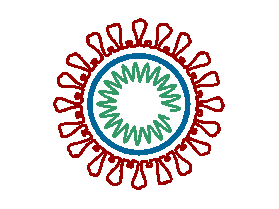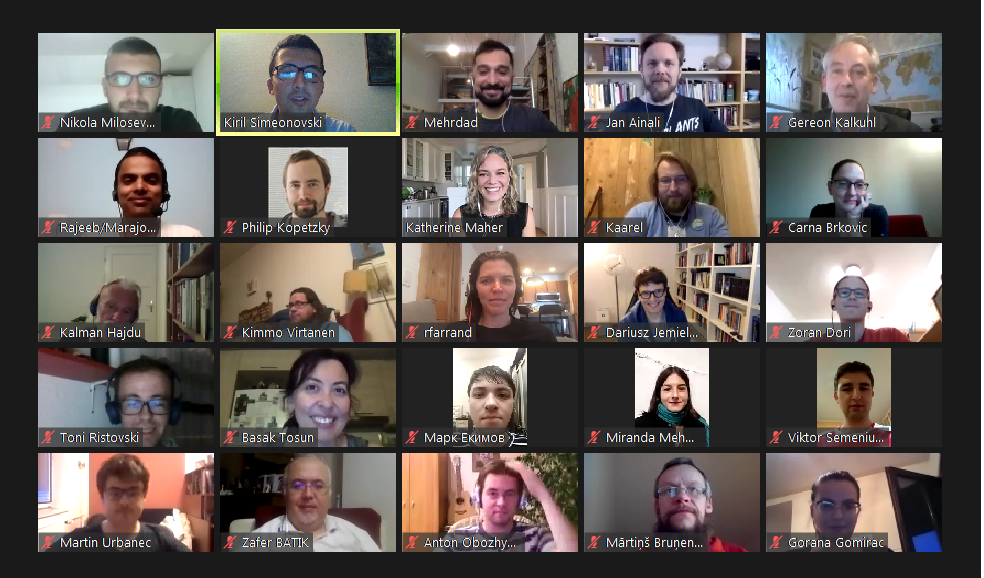
The cancellation of all in-person events due to the COVID-19 pandemic, including the Wikimedia Summit and Wikimania, earlier this year literally meant that the Wikimedians from Central and Eastern Europe could not meet in-person for the ninth consecutive year at the Wikimedia CEE Meeting 2020 in Ohrid from 18–20 September. However, the members of the programme committee have decided to organise an online conference to replace the cancelled and postponed event. The event was known as Wikimedia CEE Online Meeting 2020, labelled with the slogan “Stay Stronger Online!”, and took place from 2–4 October. The three-day programme attracted about 110 participants from different parts of the world, with each of them having attended at least one session at the event.
Major changes and novelties
The main change and novelty this year was, of course, the new environment in which the conference took place. This has necessitated other noticeable changes compared to the previous in-person editions of the conference.
- Global participation. Despite the fact that the conference is intended for Wikimedians from Central and Eastern Europe, the lack of significant participatory restrictions — travel and accommodation costs — allowed people to attend literally from every spot in the world with access to Internet. This was a one-off opportunity for people from the other parts of the world to meet with their colleagues from the CEE region, become familiar with their work and share their own learning. At the end, there were participants from the United States, India, France, Spain, Italy, Ghana, Israel, Jordan and other countries not affiliated with the CEE region.
- Shorter duration of sessions. Sessions at in-person meetings are typically 90 minutes long but, given the online environment of the event and the difficulty to keep high level of concentration, their duration at this event was halved. Most speakers have accommodated their sessions accordingly, although there were instances of extended discussions during the immediately succeeding breaks.
- Language interpretation. This was the first Wikimedia CEE Meeting and perhaps the first major conference in the Wikimedia movement with simultaneous interpretation. Considering the growing number of participants from the communities of Russia with preference towards Russian over English, all sessions in the main programme were simultaneously interpreted from Russian into English and vice versa.
- Overlapping session formats. While the difference between lectures, workshops, panels and discussions is evident at in-person conferences, it is less pronounced in an online environment to the degree that they even overlap. In general, the sessions at the conference consisted of presentations followed by questions from the audience with significant interaction added through the chat.
A brief recap of the conference
The online conference was hosted using Zoom thanks to Wikimedia Polska’s willingness to lend its licence to the conference organisers. They have also held a training on how to use the platform and this was particularly important because it helped organisers to provide instructions about the conference tool in the participants’ guide. Participants could register by adding their username to an on-wiki list of participants but it was required to confirm registration by getting the tickets for free from the conference’s Eventbrite page. Since some of the interested participants raised concerns regarding the safety of the event and the potential risk of having unwelcomed people, a passcode was introduced and shared via email with the registered participants only. Additionally, a safety team was constituted to take care that participants abide by the friendly space policies throughout the event.
The first session of the conference was a fireside chat titled “Learning from the new reality” in which Kiril Simeonovski, Chair of the Wikimedia CEE Online Meeting 2020 organising committee, asked questions about the changing processes in the movement caused by the COVID-19 pandemic that Katherine Maher, Executive Director of the Wikimedia Foundation, answered in her capacity. Some of the topics featured in the chat related the future development of the Wikimedia 2030 Movement Strategy, the upcoming Universal Code of Conduct and the recently launched Risk Assessment Protocol, with the focus not only on their substance but more on the learning from their development and the readiness to re-use that learning.

The rest of the programme consisted of sessions covering a number of topics formatted as lectures, workshops, panels, discussions and lightning talks with a standardised duration of 45 minutes per session. There was only one session in a time slot given the event’s new environment and participants were allowed to join only the session that they were particularly interested in. The second day’s programme was extended to include a non-public session for a limited number of participants upon request by its facilitator and two workshops that took place in breakout rooms. Most of the sessions at the conference were recorded and documented on etherpads. An integral part of this year’s conference was the simultaneous interpretation from English into Russian and vice versa..
Speakers and facilitators were mostly experienced Wikimedians, although there were new faces as always. They covered a wide variety of topics such as new ideas about projects and initiatives, learning from past activities and campaigns, the movement strategy and community growth, and the impact of the COVID-19 pandemic. Among others, there were sessions on Abstract Wikipedia, Wikispore, 1Lib1Ref and Wikimedia CEE Spring; an interactive session in which participants were asked to share the successful writing campaigns in their communities; and a session specifically tailored to accommodate a series of lightning talks on how CEE communities cope with the COVID-19 pandemic.
As a result of the new participants’ environment and lack of physical contact, the only social event was an online hangout after the first day’s programme in which participants played a game to introduce themselves while also exchanging Wikimedia-related questions to reveal more about their experience in the movement.
Post-conference activities
The immediate post-conference period was followed by the introduction of two new initiatives inspired by the format and topics of the conference. They are CEE Talks and CEE Meets You.
- CEE Talks. Some sessions at the Wikimedia CEE Meetings involve dynamic and intense discussions with no clear conclusions that demand a post-conference follow-up that is not provided and the topics become stale until a future event of the similar size. In order to solve this problem, CEE Talks were introduced as open virtual discussions on topics of interest for Wikimedians from Central and Eastern Europe with the goal of more efficient and transparent decision-making and call for action. The initiative encourages Wikimedians to freely schedule virtual discussions on topics that they think would be beneficial for the CEE communities.
- CEE Meets You. The allowed global participation at the online conference helped the CEE region open up more to the rest of the Wikimedia movement. In the light of extending greater future collaboration, CEE Meets You was introduced as an initiative with the goal of establishing and improving the collaboration between Wikimedians from Central and Eastern Europe and the other regional hubs in the Wikimedia movement. These collaborations can expand the linguistic scope of the writing contests such as CEE Spring, Wikipedia Asian Month or Bridges across Culture, as well as help to learn more about the strategic needs and priorities of the other regional hubs.
The next edition of the conference will hopefully be an in-person event that will take place as Wikimedia CEE Meeting 2021 in Ohrid from 10–12 September 2021.

Can you help us translate this article?
In order for this article to reach as many people as possible we would like your help. Can you translate this article to get the message out?
Start translation